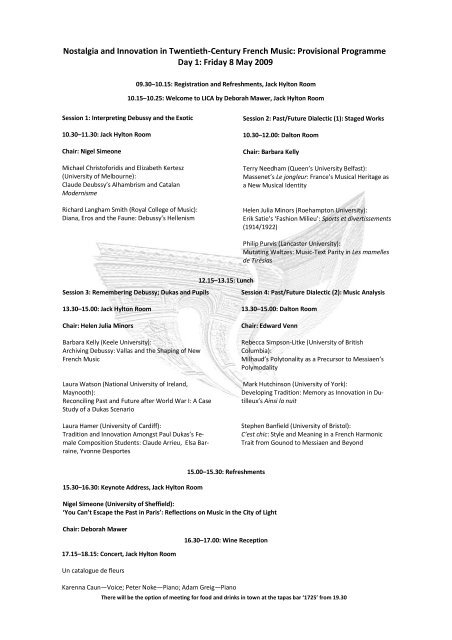Nostalgia and Innovation in Twentieth-Century French Music ...
Nostalgia and Innovation in Twentieth-Century French Music ...
Nostalgia and Innovation in Twentieth-Century French Music ...
You also want an ePaper? Increase the reach of your titles
YUMPU automatically turns print PDFs into web optimized ePapers that Google loves.
<strong>Nostalgia</strong> <strong>and</strong> <strong>Innovation</strong> <strong>in</strong> <strong>Twentieth</strong>-<strong>Century</strong> <strong>French</strong> <strong>Music</strong>: Provisional Programme<br />
Day 1: Friday 8 May 2009<br />
Session 1: Interpret<strong>in</strong>g Debussy <strong>and</strong> the Exotic<br />
10.30–11.30: Jack Hylton Room<br />
Chair: Nigel Simeone<br />
Michael Christoforidis <strong>and</strong> Elizabeth Kertesz<br />
(University of Melbourne):<br />
Claude Deubssy’s Alhambrism <strong>and</strong> Catalan<br />
Modernisme<br />
Richard Langham Smith (Royal College of <strong>Music</strong>):<br />
Diana, Eros <strong>and</strong> the Faune: Debussy’s Hellenism<br />
Session 3: Remember<strong>in</strong>g Debussy; Dukas <strong>and</strong> Pupils<br />
13.30–15.00: Jack Hylton Room<br />
Chair: Helen Julia M<strong>in</strong>ors<br />
Barbara Kelly (Keele University):<br />
Archiv<strong>in</strong>g Debussy: Vallas <strong>and</strong> the Shap<strong>in</strong>g of New<br />
<strong>French</strong> <strong>Music</strong><br />
Laura Watson (National University of Irel<strong>and</strong>,<br />
Maynooth):<br />
Reconcil<strong>in</strong>g Past <strong>and</strong> Future after World War I: A Case<br />
Study of a Dukas Scenario<br />
Laura Hamer (University of Cardiff):<br />
Tradition <strong>and</strong> <strong>Innovation</strong> Amongst Paul Dukas’s Female<br />
Composition Students: Claude Arrieu, Elsa Barra<strong>in</strong>e,<br />
Yvonne Desportes<br />
15.30–16.30: Keynote Address, Jack Hylton Room<br />
12.15–13.15: Lunch<br />
15.00–15.30: Refreshments<br />
Session 2: Past/Future Dialectic (1): Staged Works<br />
10.30–12.00: Dalton Room<br />
Chair: Barbara Kelly<br />
Terry Needham (Queen’s University Belfast):<br />
Massenet’s Le jongleur: France’s <strong>Music</strong>al Heritage as<br />
a New <strong>Music</strong>al Identity<br />
Helen Julia M<strong>in</strong>ors (Roehampton University):<br />
Erik Satie’s ‘Fashion Milieu’: Sports et divertissements<br />
(1914/1922)<br />
Philip Purvis (Lancaster University):<br />
Mutat<strong>in</strong>g Waltzes: <strong>Music</strong>-Text Parity <strong>in</strong> Les mamelles<br />
de Tirésias<br />
Session 4: Past/Future Dialectic (2): <strong>Music</strong> Analysis<br />
13.30–15.00: Dalton Room<br />
Chair: Edward Venn<br />
Nigel Simeone (University of Sheffield):<br />
‘You Can’t Escape the Past <strong>in</strong> Paris’: Reflections on <strong>Music</strong> <strong>in</strong> the City of Light<br />
Chair: Deborah Mawer<br />
17.15–18.15: Concert, Jack Hylton Room<br />
Un catalogue de fleurs<br />
09.30–10.15: Registration <strong>and</strong> Refreshments, Jack Hylton Room<br />
10.15–10.25: Welcome to LICA by Deborah Mawer, Jack Hylton Room<br />
16.30–17.00: W<strong>in</strong>e Reception<br />
Karenna Caun—Voice; Peter Noke—Piano; Adam Greig—Piano<br />
Rebecca Simpson-Litke (University of British<br />
Columbia):<br />
Milhaud’s Polytonality as a Precursor to Messiaen’s<br />
Polymodality<br />
Mark Hutch<strong>in</strong>son (University of York):<br />
Develop<strong>in</strong>g Tradition: Memory as <strong>Innovation</strong> <strong>in</strong> Dutilleux’s<br />
A<strong>in</strong>si la nuit<br />
Stephen Banfield (University of Bristol):<br />
C’est chic: Style <strong>and</strong> Mean<strong>in</strong>g <strong>in</strong> a <strong>French</strong> Harmonic<br />
Trait from Gounod to Messiaen <strong>and</strong> Beyond<br />
There will be the option of meet<strong>in</strong>g for food <strong>and</strong> dr<strong>in</strong>ks <strong>in</strong> town at the tapas bar ‘1725’ from 19.30
<strong>Nostalgia</strong> <strong>and</strong> <strong>Innovation</strong> <strong>in</strong> <strong>Twentieth</strong>-<strong>Century</strong> <strong>French</strong> <strong>Music</strong>: Provisional Programme<br />
Day 2: Saturday 9 May 2009<br />
Session 5: <strong>Nostalgia</strong> <strong>and</strong> <strong>Innovation</strong> (1): Satie,<br />
Ravel <strong>and</strong> Les Six<br />
10.00–12.00: Jack Hylton Room<br />
Chairs: Deborah Mawer <strong>and</strong> Adam Greig<br />
Emily Kilpatrick (University of Adelaide):<br />
How to Pass a Spanish Hour: Ravel’s<br />
‘reConcepcion’ of Bizet<br />
Jonathan Hicks (University of Oxford):<br />
Enfantillage as a Mode of <strong>Nostalgia</strong>: Erik Satie’s<br />
Children’s Pieces of 1913<br />
(5-m<strong>in</strong>ute break)<br />
Juliane Dorsch (Royal Holloway, University of<br />
London):<br />
Innovative Reconstruction: The Nostalgic Potential<br />
of La création du monde (1923)<br />
Roy Howat (Royal Academy of <strong>Music</strong>):<br />
Sunday <strong>in</strong> the Park with Poupoule: Poulenc’s<br />
Concert champêtre<br />
Session 7: Post-War Developments: Musique<br />
concrète, Spectralism, Boulez<br />
13.30–15.30: Jack Hylton Room<br />
Chairs: Antti Saario <strong>and</strong> Mart<strong>in</strong> Iddon<br />
Tatjana Böhme-Mehner (Mart<strong>in</strong>-Luther-Universität):<br />
Between <strong>Innovation</strong> <strong>and</strong> <strong>Innovation</strong>, a Moment of<br />
<strong>Nostalgia</strong>: How to Read a History of ‘Concrete <strong>Music</strong>’?<br />
Edward Campbell (University of Aberdeen):<br />
A Parisian Mélange: Michaël Lév<strong>in</strong>as <strong>and</strong> Les aragons<br />
(5-m<strong>in</strong>ute break)<br />
Jonathan Goldman (University of Victoria):<br />
Between Descartes <strong>and</strong> Rameau: What does Boulez<br />
have to Say about Spectralism?<br />
David Walters (Marmara University):<br />
‘J’ai l’horreur du souvenir!’: A Reappraisal of Pierre<br />
Boulez’s Conception of the Role of Tradition <strong>in</strong><br />
Composition Today<br />
09.30–10.00: Refreshments, Jack Hylton Room<br />
12.15–13.15: Lunch<br />
Session 6: <strong>Nostalgia</strong> <strong>and</strong> <strong>Innovation</strong> (2): La Jeune<br />
France<br />
10.00–11.30: Dalton Room<br />
Chair: Christopher D<strong>in</strong>gle<br />
Michael Ch<strong>and</strong>ler (Canterbury Christ Church<br />
University):<br />
‘Dazzlement’ <strong>and</strong> the ’Present Moment’ <strong>in</strong><br />
Messiaen’s Quatuor pour la f<strong>in</strong> du Temps (1941)<br />
Luigi Irl<strong>and</strong><strong>in</strong>i:<br />
Messiaen’s Gagaku (1962)<br />
Cécile Auzolle (Université de Poitiers):<br />
Daniel-Lesur’s Andrea del Sarto: Dar<strong>in</strong>g <strong>and</strong><br />
<strong>Nostalgia</strong><br />
Session 8: Poulenc, Surrealism <strong>and</strong> Hysteria<br />
13.30–14.30: Dalton Room<br />
Chair: Richard Langham Smith<br />
Jeremy Cox <strong>and</strong> Darla Crisp<strong>in</strong> (Royal College of<br />
<strong>Music</strong>/ Orpheus Institute):<br />
Present<strong>in</strong>g Absence: Nostalgic Tropes <strong>in</strong> Four<br />
Poems of Guillaume Apoll<strong>in</strong>aire Set to <strong>Music</strong> by<br />
Francis Poulenc<br />
Colette Simonot (McGill University):<br />
Bells <strong>and</strong> Blades: Hysteria <strong>in</strong> Dialogues des<br />
Carmélites<br />
15.30: Conclud<strong>in</strong>g Remarks <strong>and</strong> Refreshment, Jack Hylton Room

















